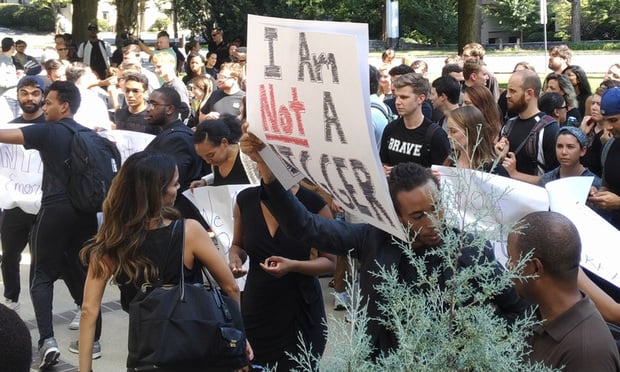Emory Law Professor in Hot Water for Allegedly Using Racial Slur, Again
Emory law professor Paul Zwier, who was disciplined last summer after students complained of his use of the "N-word" in class, reportedly used the slur again in a conversation with a black student on Oct. 31.
November 14, 2018 at 02:45 PM
4 minute read
 Emory students at the “Unity Rally” held on Aug. 29 at the Emory College of Law building. (Photo: Greg Land/ALM)
Emory students at the “Unity Rally” held on Aug. 29 at the Emory College of Law building. (Photo: Greg Land/ALM)
The Emory law professor whose in-class use of a racial slur last summer spurred a campus rally was placed on leave pending an investigation after he allegedly used the term again last week.
An online petition calling for the ouster of professor Paul Zwier in response to the latest incident accuses him of using the N-word in a one-on-one conversation with a black student on Oct. 31.
When asked why he used it, the petition quotes Zwier as saying the word was used “in a private conversation between two people, as we talk about what our experiences are, I did not feel like there was the same kind of harm that was to be caused, or the ability to be misunderstood.”
A statement issued by Emory Law Interim Dean James Hughes Jr. said Zwier “has been placed on administrative leave following reports that he recently repeated the same racial slur that he used in a classroom lecture earlier this semester.”
Zwier did not respond to a request for comment, but in an email to “The Emory Wheel,” which first reported on the incident, he said he had “been advised by counsel not to submit to any interviews during the pendency of the investigation.”
In response to a request for information about the incident and investigation, an Emory spokeswoman only provided Hughes' statement.
 Emory law professor Paul Zwier (Courtesy photo)
Emory law professor Paul Zwier (Courtesy photo)Zwier sparked a firestorm in August when, in addressing a first-year torts class, he used the slur when discussing a 1967 case involving a black man who was denied service at a Texas restaurant. Zwier had said he speculated that the manager used a racial slur.
Zwier issued two written apologies, but the outcry led to a two-year bar on him teaching any course in which students are unable to choose another professor, and requirements that he undergo sensitivity and unconscious bias training, engage in sensitivity dialogues and revise his teaching manuals to reflect ways to address sensitive topics.
It also led to a “Unity Rally” at the school where organizers called for tolerance and respect on campus.
Hughes' statement on the new incident said that Emory's “commitment to the core values of diversity, inclusion and respect is longstanding and non-negotiable. We have been guided by these values in responding to both of these incidents.
“As we continue to gather the facts regarding these allegations,” it said, “it is my pledge to continue to uphold the values that guide our university, and to update the Emory Law community as we work together to heal and grow.”
But the “Call to Action” posted by the Concerned Student Body, Emory Black Law Students Association and Emory Law Student Bar Association is less forgiving.
Addressed to Hughes, Provost Dwight McBride, the Emory board of trustees and the “Greater Community,” the petition said “Zwier's words and actions undermine the academic, social, and professional environment that we have worked so hard to cultivate.”
The petition asks that Zwier be fired immediately, and that his scheduled classes be reassigned or offered elsewhere.
It also seeks mandatory cultural competency, bias and sensitivity training for all faculty, and the creation of a committee to address the issues of “race, culture, religion, and marginalized groups.”
A third request is for more transparency regarding student input surrounding faculty hiring and retention.
“These requests reflect the needs and concerns of students who came together to support the African American students struggling first-hand. In unity, we are repairing and reviving our beloved community,” it said.
This content has been archived. It is available through our partners, LexisNexis® and Bloomberg Law.
To view this content, please continue to their sites.
Not a Lexis Subscriber?
Subscribe Now
Not a Bloomberg Law Subscriber?
Subscribe Now
NOT FOR REPRINT
© 2025 ALM Global, LLC, All Rights Reserved. Request academic re-use from www.copyright.com. All other uses, submit a request to [email protected]. For more information visit Asset & Logo Licensing.
You Might Like
View All
From 'Confusing Labyrinth' to Speeding 'Roller Coaster': Uncertainty Reigns in Title IX as Litigators Await Second Trump Admin
6 minute read
University of Georgia School of Law Finds Next Dean on Its Own Faculty
3 minute read
Teen Charged in Barrow School Shooting and His Father to Stay in Custody After Hearings
5 minute readTrending Stories
- 1Relaxing Penalties on Discovery Noncompliance Allows Criminal Cases to Get Decided on Merit
- 2Reviewing Judge Merchan's Unconditional Discharge
- 3With New Civil Jury Selection Rule, Litigants Should Carefully Weigh Waiver Risks
- 4Young Lawyers Become Old(er) Lawyers
- 5Caught In the In Between: A Legal Roadmap for the Sandwich Generation
Who Got The Work
J. Brugh Lower of Gibbons has entered an appearance for industrial equipment supplier Devco Corporation in a pending trademark infringement lawsuit. The suit, accusing the defendant of selling knock-off Graco products, was filed Dec. 18 in New Jersey District Court by Rivkin Radler on behalf of Graco Inc. and Graco Minnesota. The case, assigned to U.S. District Judge Zahid N. Quraishi, is 3:24-cv-11294, Graco Inc. et al v. Devco Corporation.
Who Got The Work
Rebecca Maller-Stein and Kent A. Yalowitz of Arnold & Porter Kaye Scholer have entered their appearances for Hanaco Venture Capital and its executives, Lior Prosor and David Frankel, in a pending securities lawsuit. The action, filed on Dec. 24 in New York Southern District Court by Zell, Aron & Co. on behalf of Goldeneye Advisors, accuses the defendants of negligently and fraudulently managing the plaintiff's $1 million investment. The case, assigned to U.S. District Judge Vernon S. Broderick, is 1:24-cv-09918, Goldeneye Advisors, LLC v. Hanaco Venture Capital, Ltd. et al.
Who Got The Work
Attorneys from A&O Shearman has stepped in as defense counsel for Toronto-Dominion Bank and other defendants in a pending securities class action. The suit, filed Dec. 11 in New York Southern District Court by Bleichmar Fonti & Auld, accuses the defendants of concealing the bank's 'pervasive' deficiencies in regards to its compliance with the Bank Secrecy Act and the quality of its anti-money laundering controls. The case, assigned to U.S. District Judge Arun Subramanian, is 1:24-cv-09445, Gonzalez v. The Toronto-Dominion Bank et al.
Who Got The Work
Crown Castle International, a Pennsylvania company providing shared communications infrastructure, has turned to Luke D. Wolf of Gordon Rees Scully Mansukhani to fend off a pending breach-of-contract lawsuit. The court action, filed Nov. 25 in Michigan Eastern District Court by Hooper Hathaway PC on behalf of The Town Residences LLC, accuses Crown Castle of failing to transfer approximately $30,000 in utility payments from T-Mobile in breach of a roof-top lease and assignment agreement. The case, assigned to U.S. District Judge Susan K. Declercq, is 2:24-cv-13131, The Town Residences LLC v. T-Mobile US, Inc. et al.
Who Got The Work
Wilfred P. Coronato and Daniel M. Schwartz of McCarter & English have stepped in as defense counsel to Electrolux Home Products Inc. in a pending product liability lawsuit. The court action, filed Nov. 26 in New York Eastern District Court by Poulos Lopiccolo PC and Nagel Rice LLP on behalf of David Stern, alleges that the defendant's refrigerators’ drawers and shelving repeatedly break and fall apart within months after purchase. The case, assigned to U.S. District Judge Joan M. Azrack, is 2:24-cv-08204, Stern v. Electrolux Home Products, Inc.
Featured Firms
Law Offices of Gary Martin Hays & Associates, P.C.
(470) 294-1674
Law Offices of Mark E. Salomone
(857) 444-6468
Smith & Hassler
(713) 739-1250







